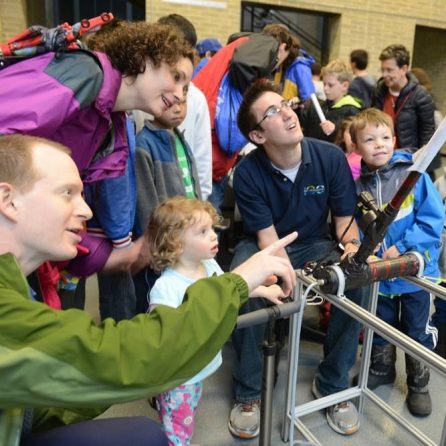Graduate Teaching Opportunities

The AeroAstro 2020 Strategic Plan outlines three fundamental values that are key to the department as an organization, anchored by a strong sense of ethics and integrity at the heart of the decisions we make and the actions we take. For graduate students, teaching is an important experience to incorporate into their education, and thanks to the close partnership with the MIT Teaching and Learning Lab (TLL), there is a deep connection between our departmental values and the outcomes of teaching experience, outlined here:
AeroAstro Value: Lead through excellence in research and education
We lead through invention, innovation, and discovery from the interaction between research and education. The aims are twofold: we spark the research interest of the students, through our education; and we also apply a critical-thinking research mindset to our education.
AeroAstro Value: Succeed together
Learning is collaborative. As teachers, we want to encourage student participation in this process through active learning strategies, in which students, as well as teachers, are actively engaged with the process of learning. Facilitating discussions, in which the students all together can learn from each other, allows us to succeed together in the learning process.
AeroAstro Value: Create an open, diverse, inclusive, and supportive community
Teaching is a key way of communicating the value of diversity and inclusion. In our courses, we foster a welcome and supportive climate for all students. We emphasize the accessibility of academic resources and support transparency in students’ expectations. Additionally, as teachers, it is crucial to be aware of our own implicit biases to be able to create an environment that encourages academic belonging for everyone.
Teaching Opportunities
As a teaching assistant, you will have a set of responsibilities to support the course you have been assigned to. The list below is not exhaustive, and the specific responsibilities will depend on the course.
- Attending lectures: to better understand the topics that are covered in class, as so, to be able to help students better during recitations and office hours.
- Teaching during regular class sessions: Some professors give TAs the opportunity to teach a topic during one or multiple lectures. If you’re interested in such an opportunity, ask your professor!
- Leading recitations: This can involve revisiting materials covered in the lecture, going through exercises, or teaching additional topics.
- Holding office hours to help students with questions about the course material or about problem sets.
- Designing problem sets and/or exams in collaboration with faculty responsible for the course.
- Grading problem sets and/or exams. Some courses will also have undergraduate graders to help.
For a teaching assistantship, approximately 20 hours of work per week are expected on average over a semester.
It is advised that TAs discuss the course-specific responsibilities and expectations early in or before the start of the semester together with their professor.
AeroAstro generally offers around 20 teaching assistantship appointments each year. If you are interested in a teaching assistantship for the next term, contact aagradinfo@mit.edu. AeroAstro students may also have a teaching assistantship appointment in other departments. Common departments are Mechanical Engineering (MechE) and Electrical Engineering and Computer Science (EECS). For more information, contact Lisa Bella (EECS) or Sarah Collins (MechE).
A teaching assistantship pays full tuition, health insurance, and a monthly stipend. Learn more about MIT’s teaching assistantship policies. Students can also teach on a volunteer basis for credit, under course number 16.999: Teaching in Aeronautics and Astronautics. Please discuss this with your advisor if you’re interested.
TA Training, Resources, & opportunities
Teaching assistants at AeroAstro get trained through the TA Days, a series of workshops organized by the Teaching + Learning Lab (TLL). The TA days take place in the late summer for Fall TAs, and in January (IAP) for Spring TAs. The AeroAstro teaching development fellowship fellow will offer workshops and/or events for graduate students throughout the academic year. The TLL offers a wide range of teaching programs and training: the Kaufman Teaching Certificate and Grad Teaching Development Tracks.
Learn more about TLL programming for graduate students.
MIT also offers a wide range of teaching and outreach opportunities:
The goals of the teaching development fellowship (TDF) at AeroAstro are:
- Promoting pedagogical development among peers at AeroAstro
- Providing training, resources, and mentorship to teaching assistants in the department
- Develop a community of students interested in teaching
The TDF Fellows check-in with the TAs in the department multiple times throughout the semester. Examples of workshops that have been organized in the past in the department are:
- Make Learning Easier: Facilitate learning through mentoring & tutoring workshop
- Communication & Feedback workshop
- Experienced faculty panel discussion
- AeroAstro teach-off
Contact
For any questions about teaching at AeroAstro, please reach out to the current AeroAstro Teaching Development Fellow (Joao Cavalcanti Vilela). Any specific questions related to digital education can be addressed to Professor David Darmofal, AeroAstro’s Director of Digital Learning.